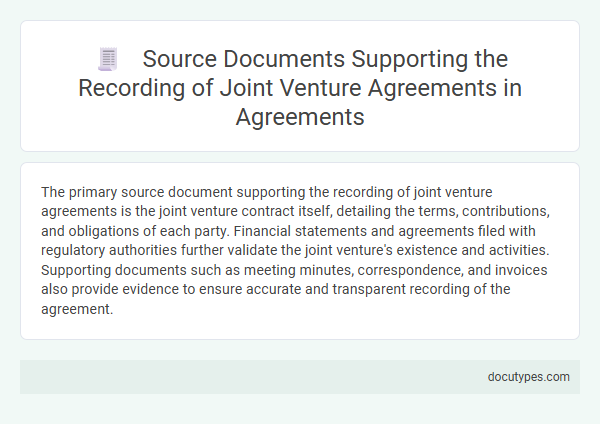The primary source document supporting the recording of joint venture agreements is the joint venture contract itself, detailing the terms, contributions, and obligations of each party. Financial statements and agreements filed with regulatory authorities further validate the joint venture's existence and activities. Supporting documents such as meeting minutes, correspondence, and invoices also provide evidence to ensure accurate and transparent recording of the agreement.
Introduction to Joint Venture Agreement Documentation
Joint Venture Agreements require precise documentation to ensure clear understanding between parties involved. The primary source document supporting the recording of these agreements is the Joint Venture Agreement itself.
This document outlines the roles, responsibilities, capital contributions, and profit-sharing mechanisms. You rely on this source to accurately reflect the terms and conditions agreed upon by all joint venture partners.
Importance of Source Documents in Agreements
Source documents are essential for accurately recording joint venture agreements as they provide verified evidence of the terms and conditions agreed upon by the parties involved. These documents include signed contracts, negotiation records, and correspondence, ensuring transparency and legal compliance. Proper source documentation minimizes disputes and supports financial reporting and auditing processes related to the joint venture.
Types of Source Documents for Joint Ventures
Source documents play a crucial role in accurately recording joint venture agreements in accounting records. These documents provide the necessary evidence and details to ensure proper recognition and measurement of joint venture transactions.
- Joint Venture Agreement - This formal contract outlines the terms, roles, contributions, and profit-sharing arrangements between the parties involved in the joint venture.
- Financial Statements - Interim or audited financial reports of the joint venture provide essential data on assets, liabilities, revenues, and expenses related to the partnership.
- Capital Contribution Records - Documents detailing the cash, assets, or services each partner contributes to the joint venture support the capital account entries and investment tracking.
Accurate source documents ensure transparency and compliance in the accounting of joint venture agreements.
Legal Requirements for Source Documentation
The primary source document supporting the recording of joint venture agreements is the executed joint venture contract itself. This document outlines the terms, obligations, and contributions of each party involved, serving as the foundational legal record.
Legal requirements for source documentation mandate that the joint venture agreement must be signed by all parties to ensure enforceability and authenticity. Supporting documents such as board resolutions authorizing the agreement and financial statements reflecting contributions often accompany the contract. These records provide evidence of compliance with regulatory standards and facilitate accurate accounting and audit trails.
Common Source Documents in Joint Venture Agreements
Common source documents supporting the recording of joint venture agreements include the joint venture contract itself, financial statements, and board resolutions authorizing the collaboration. These documents provide essential evidence of the terms, capital contributions, profit-sharing arrangements, and governance structures agreed upon by the parties. You should ensure accurate documentation to maintain transparency and compliance throughout the joint venture's lifecycle.
Verification and Authentication of Source Documents
Source documents supporting the recording of joint venture agreements are critical for verification and authentication to ensure accurate financial reporting. These documents validate the agreement's terms and confirm the legitimacy of the recorded transactions.
- Joint Venture Contract - This primary document outlines the obligations and contributions of each party, serving as the foundational evidence for the agreement.
- Board Resolutions - Official approvals recorded by the involved parties provide legal endorsement and confirm the authorization of the joint venture.
- Financial Statements - Audited reports related to the joint venture offer verification of the financial data linked to the agreement's execution.
Document Retention Policies for Joint Ventures
Source documents such as joint venture agreements, contracts, and signed amendments support the accurate recording of joint venture agreements. These documents provide essential evidence for financial reporting and legal compliance.
Document retention policies for joint ventures require you to securely store these source documents for a specified period, often seven years or more, depending on regulatory requirements. Proper retention ensures audit readiness and protects your interests in case of disputes or reviews.
Electronic vs. Physical Source Documents
What source document supports the recording of joint venture agreements? Joint venture agreements can be supported by either electronic or physical source documents. Electronic documents include digitally signed contracts stored in secure cloud systems, while physical documents consist of original signed paper agreements filed in corporate records.
Challenges in Documenting Joint Venture Agreements
| Aspect | Details |
|---|---|
| Source Document for Recording Joint Venture Agreements | Joint venture agreements are primarily supported by the signed joint venture contract, which outlines the terms, contributions, profit-sharing, and operational responsibilities among parties involved. |
| Key Supporting Documents | Articles of association, partnership deeds, meeting minutes, financial statements, and regulatory filings act as supplementary validation sources for recording joint venture transactions. |
| Challenges in Documentation | Inconsistencies in contract terms, incomplete records of financial contributions, conflicting interpretations of profit-sharing clauses, and delays in regulatory approvals commonly hinder accurate documentation. |
| Impact of Poor Documentation | Ambiguities may lead to disputes, improper allocation of assets and liabilities, non-compliance risks, and challenges in financial auditing and reporting related to the joint venture. |
| Best Practices | Establishing clear, comprehensive contracts, maintaining detailed financial records, obtaining timely approvals, and consistent internal communication improve reliability of joint venture documentation. |
What Source Document Supports the Recording of Joint Venture Agreements? Infographic

